Gulf Region Reaches 1,000 As It Goes From Strength To Strength |
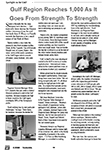 |
<<Click to see original |
Spare a thought for the long distance lorry drivers — but especially those driving the Almarai reefers streaming along the road that leads from Al Kharj via Haradh towards the Emirates over a small corner of the Rhub al Khali.
Twenty reefers a day make the journey to take fresh produce to Abu Dhabi, Al Ain, Fujuraih, Ras al Khaimah, Sharjah and, of course, Dubai – the nerve centre of Almarai’s operations in the Gulf Region which consists of Kuwait, Qatar, Bahrain, UAE and Oman.
Regional General Manager Shine E.R. explains that just under a third of Almarai’s produce is sold in the Gulf countries. Because margins are high in these countries the Gulf region contributes 38% of the Company’s profits.
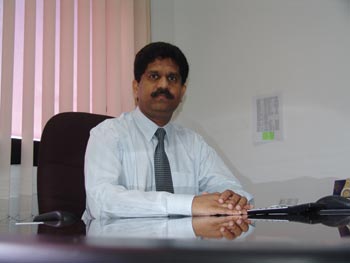
“Each territory has its own particular challenges,” he says. “Take Qatar, for instance. Because the border for reefers does not open until 5 am, any delays here can mean we are late in delivering our products to our customers.
“And in UAE, the market competition is very strong. With 10 Carrefours and 23 Lulu stores, these two hypermarket chains control nearly 20% of the overall market and they use that muscle to drive very tough deals. How we handle the big two is critical to us as the rest of the retail market closely watches and follows trends set by them.
“UAE in itself is the most developed market in the GCC in terms of retailer sophistication. International chains debut in this market and then move on to set bases in other GCC countries.”
When asked how he would evaluate his region’s performance, Shine says things have never been better. “We are doing exceptionally well. It’s all about having the right people in the right jobs. In a region that spreads across international boundaries, team work, delegation and empowerment are the key to our success.
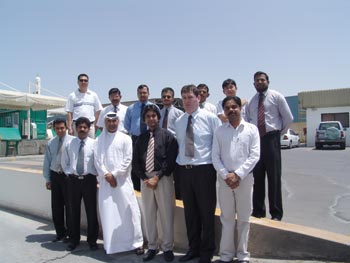
“We have Abraham David who is the Regional Sales Manager of Kuwait,” Shine continues. “Abraham has a wealth of experience having worked in KSA, Bahrain, Oman and UAE. Likewise, Michael Payne is the Regional Sales Manager for Qatar and Bahrain, but he has also worked in Saudi, Oman, Kuwait and Bahrain. Both of them have been in Almarai for the last several years.
“Annesley Greig is our Regional Logistics Manager and he makes light of his immense role, which is the timely availability of products in the entire region. C V Siva our Merchandising Manager, is committed to making Almarai the most preferred brand in the GCC by mobilising his merchandising force in the right direction. Scott Shankland, our Regional Sales Manager, is the most recent addition to our team and is already making an impact on our sales in Oman; whilst Thomas Koiraj, our Key Manager, is well capable of handling all the multinational chains.”
According to the Gulf’s HR Manager, Ameer Jaffer, the number of company staff in the region has just reached a new milestone at 1,000 people, with 360 in UAE, 260 in Kuwait, 200 in Qatar and Bahrain and 180 in Oman. “We are experiencing unprecedented rates of growth across the whole Gulf region,” he says.
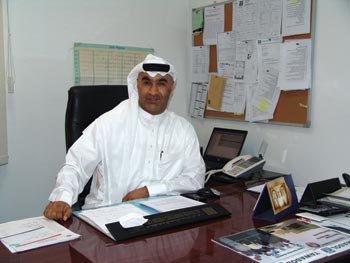
“All Almarai products sold in the Gulf are shipped in from Al Kharj, with the exception of fresh milk which is sourced from a local farm, processed and packed in Abu Dhabi.
“When we first started in this territory,” Ameer continues, “Almarai reefers could get stuck at the border crossing for very long periods, not only waiting in the long queues for their turn, but also dealing with the huge volumes of paperwork, which combined to cause us a big headache.
“But over time, the customs and health authorities have got to know that Almarai provides quality products and nowadays we are fast-tracked over the frontier at specific times of the day which helps us in our goal of providing fresh produce to our customers.”
Thoma McElligott is the Regional Sales Manager for UAE. He recalls that in the UAE at the start of 2003 there were only two depots — in Abu Dhabi and Dubai, with an unloading facility at Al Ain; but in April of that year Sharjah came on stream to serve the northern Emirates, and in February of this year Ras al Khaimah and Fujeirah became sub depots of Sharjah — though it is planned for these latter two to become independent of Sharjah by the beginning of 2007. Meanwhile Al Ain got fully fledged depot status two months ago. “It is interesting to note the difference in buying habits between the Emirates and other parts of the Almarai distribution network,” Thoma explains.
“What we find is that Arabs are passionate about laban, whilst people from the sub continent buy lots of milk, preferably with a high fat content. So as the racial mix changes markedly across the Emirates, so too do our sales volumes of particular products. You will find that Almarai is particularly strong in the ‘Northern Emirates’.
“We differ, too, in the way we sell to the major retailers. Unlike in other territories, the retailers here sell cost-to-cost and make their profits on rebate agreements”.
This theme is picked up by Regional Financial Controller Thushara Kalupahana. “In general terms, you can think of Saudi Arabia as a cash society, whilst over here much more business is done on credit, amounting to around SR120m. But our growth is phenomenal and this year sales are up 28% on last year’s figures.”
To ensure trouble-free delivery of the company’s products, Regional Fleet Manager Krishanamurthi Ramesh is responsible for the maintenance of some 250 delivery vehicles —100 in the UAE and another 150 in Kuwait, Qatar, Bahrain and Oman. He also is responsible for looking after 150 company cars and each vehicle undergoes a comprehensive service schedule, along with their cooling units. “We have very few breakdowns in our fleet,” says Ramesh with pride.
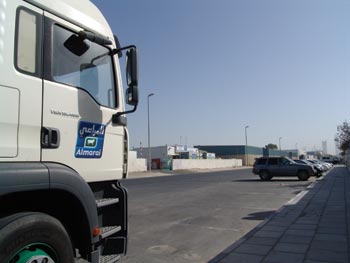
In charge of regional training is Oswald de Souza, whose job it is to help equip staff with the skills they will need in areas such as quality, sales and merchandising and health and safety.
“We also train our people in ‘soft skills’ such as presentation, negotiations, communication and team building,” he explains. “The majority of the training is done internally and is focused towards internal supervisory development. The challenges are now changing due to a high localisation policy in Oman and Bahrain where being able to get around bilingually is essential.”
And that brings us back full circle to the team of Almarai drivers who take the produce to all corners of the Gulf; drivers such as Edurado Baubista — a Filipino who has been with the company for over 12 years and who plies the Abu Dhabi -Dubai -Oman route where one delivery from the Al Kharj CPP to Oman can take three full days with the first driver covering Al Kharj to Abu Dhabi, driver number two taking on the load to Nizwa, and a third driver covering the remaining distance to Salalah.
“Safety is always a priority,” Edurado confirms, “but there is lots of paperwork to do which can hold us up at border crossings. Almarai is a good company to work for,” he adds, almost as an afterthought, but somehow you can tell he very much enjoys his job on the open road. So next time you pass an Almarai reefer on its way through the UAE, give it a wave. It might just be Edurado — or one of his colleagues — doing his bit to ensure Almarai products reach the farthest parts of the Gulf, in the freshest state possible, and helping increase Almarai’s market penetration in the process.
